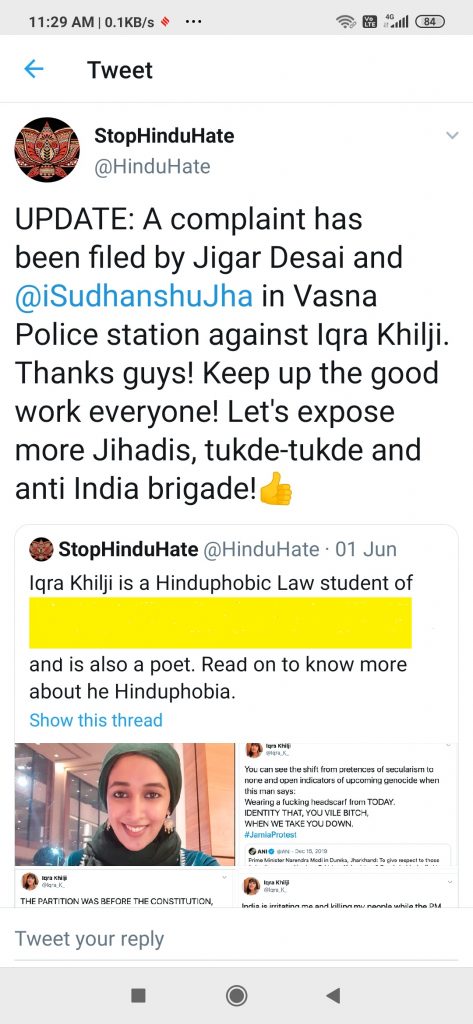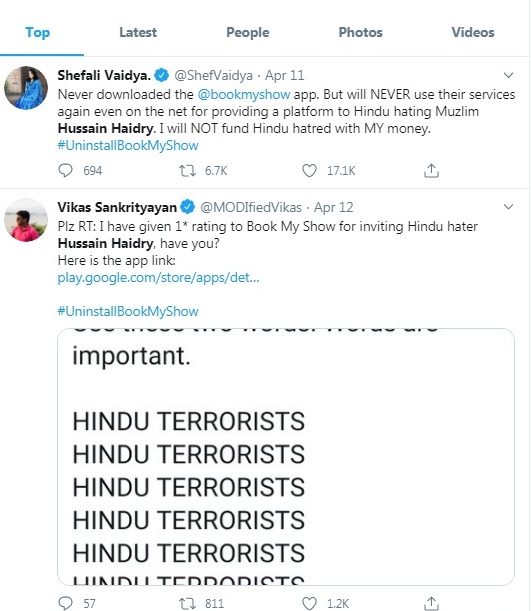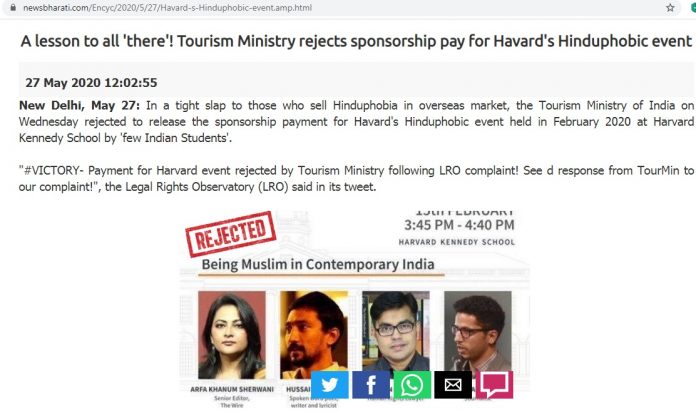Mahibul Hoque, TwoCircles.net
Delhi: Being a social media influencer on Twitter with more than twenty thousand followers, spoken word poet Hussain Haidry had to ultimately quit the micro-blogging site following extensive trolling and attacks.
Haidry believes this was because he calls ‘spade a spade’ on his social media posts.
Among the odd twenty thousand followers of Haidry included a circle of highly influential people capable of making any hashtag a trend. It is well established that what trends on Twitter has the potential to become a narrative. Losing out on such opportunities, especially for an activist, is nothing less than missing out on building an opinion among the masses.
Besides being a spoken word poet, Haidry is a Bollywood lyricist, scriptwriter, and a Muslim activist who has been vocal about injustice, manufactured hate and has also raised his voice against other social issues.
In February, he had tweeted “Use these two words. Words are important. Hindu Terrorists,” – whose screenshot was shared by many right-wing handles and had prompted a trend #BoycottTakht, a Bollywood film produced by influential producer Karan Johar. In no time the hashtag started trending on Twitter.
Simultaneously, a right-wing news portal OpIndia ran a concentrated media campaign and the IT cell of the Bharatiya Janata Party (BJP) Cell left no stone unturned to attack his profession by calling him as “Hinduphobic” for his tweet and advocating his boycott. “This strategic method worked very well for them,” Haidry said.
Haidry’s posts bring out a new perspective and represent Muslim narrative at large. The creation of a narrative by a Muslim activist with the potential of spreading like wildfire even if only a few influencers retweet or like a post is what the right-wing cannot let happen.
Not only Haidry but many Muslim social media influencers have either deactivated their accounts or have become less vocal about issues since February. Haidry claims that not more than 30 to 40 Muslim opinion-makers are on Twitter who can create a counter-narrative.
Importance of Muslim Narrative
Since Italian Marxist and intellectual Antonio Gramsci introduced the idea of cultural and political hegemony, and subaltern discourse while dissecting Karl Marx’s analysis of capitalism, the creation of narrative and dissemination of the same became an innate part of the critical social studies. He challenged the very idea of social domination (sustaining state power through enforcing institutional forces) and articulated how permeation of ruling elite class’s principles as a social norm is used to maintain the power status quo.
In contemporary Indian political context, ‘controlling the attempts of creation of ideas at nascent has become an object of principal for the ruling regime and its online machinery’. In theoretical and Gramsci’s perspective, this tactic, employed by the right-wing Hindutva nationalists, is nothing less than destroying the efforts to create a ‘counter-hegemony’ by the Indian Muslims.
Recently – just like the attack on Haidry, a massive social media attack targeting the academic career of Iqra Khilji, a law student and activist, was launched on Twitter. Since then, Khilji has gone off the microblogging site. The ‘hate campaign’ against Khilji was designed to prove her as an ‘Islamist and Hinduphobic’ and complain to her university about her social media posts.
Khilji, who is also a protest poet, said that her education in law made it vividly clear the crumbling civil liberties and injustice that happen in society.
“I tried to initiate an academically-oriented discourse on the state of human rights of marginalized communities in India, but it was inevitably interspersed with justified outrage, although reactionary. This was inevitable given the absence of rational arguments from conservative circles, whose responses, on an average, are deflection or whataboutery at best, and pure abuse at the worst,” Khilji told TwoCircles.net.

Following the arrests of activists across the country, which Paris-based International Federation for Human Rights (IFHR) termed as arbitrary, many say there is a prevailing sense of fear, especially among young rights advocates.
Moreover, in such a scenario “the attempt to create safe space for the Muslim cause and engage in dialogue has become more difficult since Modi’s second term”, says Khilji.
Similarly, a young Muslim woman freelance writer who went by the handle @pepper_smoker deactivated her Twitter account. Expressing her fear, while noting the attempts to suppress ‘vocal Muslim voices’, she said, “a simple statement about the assertion of identity can get you termed as an extremist by the mob of right-wing accounts which leads to troll attacks and attempts of doxxing.”
Efforts to ‘counter-hegemony’
Being at the receiving end of abuses and threats on social media has become a routine affair for influential activists.
However, these abuses and threats are part of a larger scheme of operations initiated by the right-wing political forces.
Going back to Haidri’s post, it is not without context. If one goes by the definition of terrorism used by USA’s Federal Bureau of Investigation (FBI) it reads, “Domestic terrorism: Violent, criminal acts committed by individuals and/or groups to further ideological goals stemming from domestic influences, such as those of a political, religious, social, racial, or environmental nature.”
Lynchings of Muslims and Dalits by the cow vigilante groups and Delhi anti-Muslim pogrom stem from the larger goal of Hindu Rashtra or Hindu Nation. The FBI definition puts things in perspective about what Haydri had written on social media.
However, reason is a snub for the right-wing forces and labelling individuals is what they employ to suit their narrative. When presenting a counter-argument Muslim opinion makers often become ‘Hinduphobic or Islamists or anti-national’ which reinforces suspicion and suspension of Muslims in global as well as in local milieu.
Modus Operandi of attacks
Haidry, in his Facebook post, tries to dissect the pattern of these attacks on influential Muslim people on the virtual sphere.
Speaking to TwoCircles.net Haidry said that online attacks fall into two categories. “These two are political and digital. In the political attack, they target people with real-world work and credibility and can create public opinion. These people who are well connected both virtually and in real-world cannot be arrested for their opinion. Hence they are discredited to create public acceptance of offensives against them.”
In his observation, he mentions, “The other kind of attack is digital which is directed towards people who are influential on social media but with much-limited reach and real-world credibility. Though they generate original ideas, their opinion is mostly shaped by the “influential” people. This group can be intimidated, bullied by the IT cell itself.”
People with wider real work influence and credibility is often targeted by renowned right-wing personalities (with verified Twitter accounts) along with “big hate news-peddlers” such as Swarajya Mag, or OpIndia which give legitimacy to question the counter-narrative initiated by a Muslim influencer. This right-wing strategy is accompanied by hatred.
Once the online attack is initiated by popular right-wing handles, and the bots and IT cell starts to amplify the attack, it reaches organic people who already subscribe to the hatred against the counter-hegemony narrative. Thus the hatred transmits from the virtual sphere to the real public sphere and this hate explodes in the already volatile society.
The pattern of attacks
Harvard University in February hosted an event with the title ‘Being Muslim in Contemporary India.’ The panel included Arfa Khanam Sherwani, a journalist at The Wire, Aman Wadud, a human rights lawyer, Raqib Hameed Naik, a Kashmiri journalist, and Hussain Haidry.
One Legal Rights Observatory group which goes by the handle @LegalLro claimed that the payment for the event was withheld by the Union Ministry of Tourism following their complaint. The so-called legal rights group, in its tweets, termed the event as “Indiaphobic/Hinduphobic”.
However, Naik who is also a board member at TwoCircles.net categorically denied the labelling and said the event was targeted because of the all Muslim panel.
“The event was just about Indian and Kashmiri Muslims and the challenges they are facing post-2014,” he said.
“Even minorities expressing themselves freely has become so threatening to right-wing forces that they use an easy pass of Hinduphobia to discredit them and bring them more danger from both the state and non-state entities that support Hindutva,” Raqib said.
But this labelling is more than accusations. Using words like ‘Hinduphobic or Indiaphobic’ is part of discrediting opinion makers. Such usage of ‘manufactured phobia’ presents the counter-narrative diametrically opposite to the accepted social status quo – which is regarded as a stable order.
This ‘manufactured phobia’ is used against any person who is critical of the majoritarian Hindutva project of ruling BJP and its parent ideologue – the Rashtriya Swayamsevak Sangh (RSS).
Similarly, usage of terms like ‘anti-national’ delegitimizes the person who is contesting the ruling party or the hegemonic ideology. The Prime Minister or the BJPs top brass are torchbearers of using such adjectives. This discrediting pattern is corroborated by many social media influencers. People this reporter spoke to shared that they face systematic and organised attacks on social media.
Doxxing is a part of the attack on social media apart from daily abuses and threats. The right-wing trolls reveal the professional affiliations of those influencers whom they consider as a threat to their ideology. The trolls attach the influencers academic institutions or the organisations they work at.
Mohammad Asif, an activist , said that it has become a basic instinct to not reveal his place of work.
“The moment my professional affiliation is known, the attack snowballs at my office,” he said.

The attackers divulge personal information such as the residential address of the influencer.
Once this is done, the attackers then file police complaints and also prompt others to file similar reports.
Afreen Fatima, student activist and councillor at Jawaharlal Nehru University Student Union, who has more than 50 thousand followers on Twitter said that since the lockdown and witch hunt of Muslim activists she has limited her online activism. “When trolls start attacking us, we do not get the support from the civil society groups at large,” she said.


